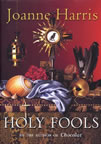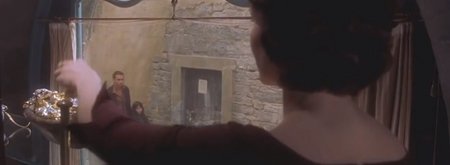Senses, Superstitions and Spirituality
Joanne Harris’ novels have been described as ‘adult fairy tales: charming, curious and threaded with magical realism’ (mostlyfiction.com). It cannot be denied that there is a clear strand of magic and superstition running through all her novels. There is also a little something else as well, that makes her books so unique and charming.
Food
When thinking of Joanne Harris, most people will instantly relate her novels to food, and rightly so. Harris has written what she refers to as her ‘trilogy of food’ - Chocolat, Blackberry Wine and Five Quarters of the Orange. Her novel Chocolat was shortlisted for the Whitbread award and plunged her into stardom in the literary world. When asked why food features so predominantly in her novels, Harris replied:
I think tastes and smells are particularly evocative to us because as newborns we first experience the world through those two senses. That means that our emotional response to a taste or a smell can act upon us at a very powerful, subconscious level. (www.joanne-harris.co.uk)
Not only are we deeply moved by her use of food within her novels, but we are highly tempted by it as well – I found it essential to have a bar of chocolate next to me as I read Chocolat. It is with her use of food, and the atmosphere that she creates with it, that her characters come alive even within books that are not part of her food trilogy.
Joanne Harris does not merely use food to describe her characters and their circumstances; food is used within her book as a key element in the plot itself. In both Chocolat and Blackberry Wine, food seems to have a magical quality. With her chocolate Vianne appears on a wind of change; with his six specials Jay finds a way to the past and a way to uncork his creativity once more. Yet in Five Quarters of the Orange she twists our expectations and desires for more magical food, and instead turns them on their heads. In this novel, food is a weapon for change - Framboise uses it to torture her mother.
Although food has played a key role in these three novels, it takes a back seat in her more recent books. Instead we are enticed not by food but by the characters and the plots that she weaves. It is through these characters that we are introduced to Joanne Harris herself. She takes her inspiration for her characters from her friends and family, and most of her protagonists are based on her family. She says:
Sometimes when I am creating a character I adopt certain features of the people around me (family, friends, colleagues), although I never try to re-create a real-life person on the page. Instead I try for emotional realism; the details may be invented, but if the feelings are true (be they rage, love, or the desire for revenge), then the characters will come to life and the plot, however unlikely, will seem more convincing to the reader. (www.joanne-harris.co.uk)
Chocolat is based on her great-grandmother - a character supposedly like Vianne who turns instead into Armande. Her daughter Anouchka features as Anouk in the novel as well. Blackberry Wine features her paternal grandfather - a man who enjoyed the earth and the things that grew out of it.
It is perhaps in Coastliners that we see the real Joanne Harris. Le Devin, the island to which Mado returns, was created from an island from Harris’ past. The story that inspired her to write about the island is echoed in Coastliners. Joanne Harris used to go on holiday with her family and grandfather to his house on the island. When her grandfather died, he left the house to his three daughters hoping they would continue to holiday there as a family. However, they decided to sell and eventually one daughter bought out the other two, demolished the house and built another. On returning to the beach where she used to play, Joanne Harris discovered that it had disappeared. This sad story that inspired Harris is reflected in the relationship between Mado and her sister Adrienne. Joanne Harris says:
I'm especially fond of Mado, that prickly, arrogant young woman, so full of good intentions, so deeply incapable of expressing them. I enjoy flawed characters ... and she and I have some things in common. (www.joanne-harris.co.uk)
Superstitions
The art of turning bad luck into good. The forking of the fingers to divert the path of malchance. The sewing of a sachet, brewing of the draught, the conviction that a spider brings good luck before midnight and bad luck after. (Chocolat, p.44)
Superstition runs through all of Joanne Harris novels - she writes of a magical realism in a genre labelled as adult fairy tales. Yet Joanne Harris does not believe in the occult or in magic. When asked if she believed in it, she answered ‘that her upbringing was by her superstitious family well versed in folklore, that and living in a haunted house has brought her to an understanding, if not quite a belief, in magic and the occult' (www.joanne-harris.co.uk).
It is this aspect of her life that is animated within the lives of her characters. Many of her characters have become obsessed and trapped in superstition; what seems like a way to make their own luck has become a fixation in which they are ensnared by rituals: ‘Rock salt and bread by the doorstep to placate any resident gods. Sandalwood on our pillow, to sweeten our dreams’ (Chocolat, p.17).
These ideas keep recurring throughout Joanne Harris’ novels; they all tell a similar tale. Yet Joanne says that she is not trying to endorse her own views through her work:
I don't believe in preaching, and I prefer the reader to draw his or her own conclusions rather than impose my own ideas. (www.joanne-harris.co.uk).
However, there are so many reccurring ideas throughout the books that, whether it is intentional or not, some of Harris’ beliefs and ideas are projected on to her plots and characters.
The Church
For one, the Catholic Church has featured in her novels many times. In Chocolat, the church is the oppressor in the small village, and the novel is a tale of war between the priest and the spiritual pagan Vianne. In Coastliners there is again a tension between the superstitious people of Les Salants and those in La Houssiniere where the church is. Within Holy Fools the church is portrayed as an oppressing hypocrite; the nuns residing at the abbey are superstitious – they do not pray to God but to the Saint Marie-de-la-Mer. However, Joanne Harris does not believe she is making any comment against the church itself:
Instead I am criticizing particular individuals who use the church as an excuse to pursue their own agenda of cruelty or dominance. A religion is only made up of the people who follow it, and like anything else, it can be a tool for good or for evil. (www.joanne-harris.co.uk).
The idea of the church as an oppressive feature is an idea that originates from neo-paganism, believing that the church is legalistic and does not allow people to pursue their own religion. In contrast to this portrayal, Jesus Christ stood against those who had become legalistic in his time, and instead encouraged people to look to him for truth and guidance rather than the rules and oppression endorsed by the Pharisees.
In her more recent novels, Joanne Harris has veered away from tempting her readers with mouth-watering descriptions of chocolates and pastries, and instead used her talent to describe the French countryside. Nowhere does she do this better than in Coastliners with the rawness of the sea and the storms, so that it really feels like you are stuck on that isolated rock. It is in this novel that the true power of nature is revealed, as well as what happens when man intervenes. There is a conflict between the superstitious Salannais and the industrialised, changing Houssins, yet it is the nature-preserving Salannais that win. Again Joanne Harris, although maybe subconsciously, is promoting neo-pagan ideas. The Houssins represent the church and the modern mindset of subduing nature for our own means; the Salannais represent the idea of what the neo-pagans believe - that we should allow nature to take its course since it is a power that cannot be restrained and should not be exploited. Again, this is a misrepresentation of the Christian faith: rather than exploiting the world, Christians believe that we should care for it as God commanded (Genesis 2:15).
Although Joanne Harris believes that she is not ‘preaching’ her own views, her opinions come across very subtly. Despite her negative representation of the church and those that believe in Christianity, Harris puts a high value on Christian ideals such as acceptance, forgiveness, self-approval, courage, love and spirituality. It is these characteristics that leap out of the pages through her characters and stand out clearly, making her stories magical fairy tales rather than the rituals that have become so confining for many of her characters.

Book title: Chocolat
Author: Joanne Harris
Publisher: Doubleday
Publication Date: 1999

Book title: Holy Fools
Author: Joanne Harris
Publisher: Doubleday
Publication Date: 1 May 2003

Book title: Blackberry Wine
Author: Joanne Harris
Publisher: Doubleday
Publication Date: 2000

Book title: Coastliners
Author: Joanne Harris
Publisher: William Morrow & Company
Publication Date: 2002

Book title: Five Quarters of the Orange
Author: Joanne Harris
Publisher: Doubleday
Publication Date: 2001
© 2005 Louise Griffiths



